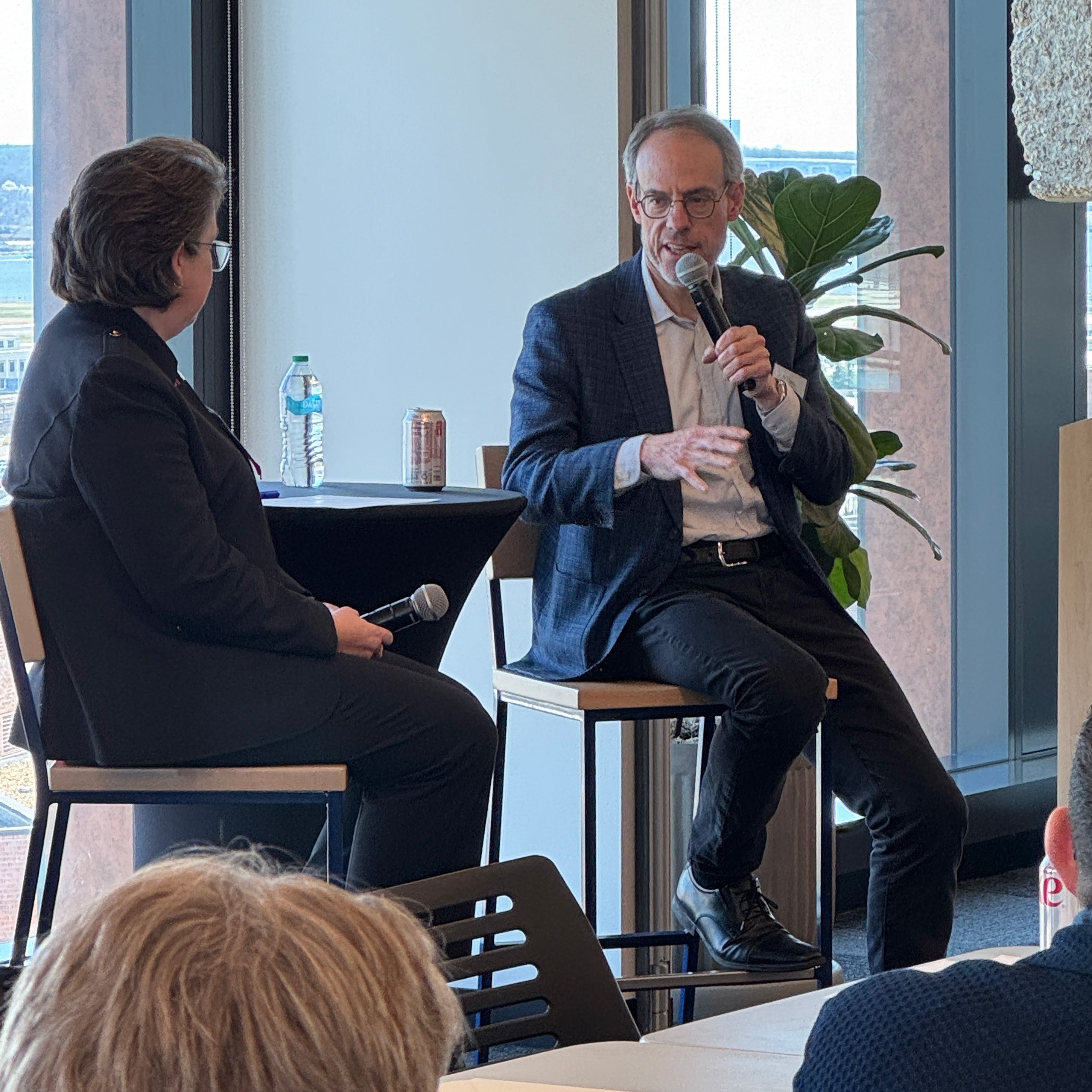Banner artwork by Dejan Dundjerski / Shutterstock.com
On March 25, ACC National Capital Region (ACC NCR) hosted a roundtable with Amazon Chief Global Affairs & Legal Officer David Zapolsky about the importance of pro bono work.
On a sunny, spring day, in a large conference room overlooking Ronald Reagan National Airport and the Potomac River, ACC NCR President Kathi Westcott queried him about his career, the 10th anniversary of Amazon’s pro bono program, and the initiatives it supports. Zapolsky shared advice for ACC members who want to do more pro bono work.
Pro bono is a requirement
Zapolsky points out that many state bar associations mandate pro bono work, albeit without any enforcement mechanism. Ever since he worked in New York City prosecuting sex-abuse cases, Zapolsky has felt an obligation and privilege as a legal professional to provide legal assistance to those who couldn’t otherwise access it. When he moved to Seattle and became a litigator, he immersed himself in pro bono work.
“This work has always been important to me, and the need is greater than ever. We have to keep optimizing to do more with the resources we have and make participation easy and engaging,” he said. “When you’re the leader of an organization and you talk about something that’s important to you, people tend to take notice, and it becomes important to them too.”
When it comes to making pro bono work for their companies, CLOs should:

- Find ways to say yes to attorneys who have passion for a cause. Empowering your legal team to pursue causes they care about not only fuels engagement, but also drives more sustainable and meaningful pro bono participation. Rather than gatekeeping based on organizational priorities alone, seek creative ways to support individual interests within appropriate boundaries — be it through flexible work policies, internal recognition, or aligning their passion projects with broader company values. A simple “yes, and…” approach can transform passive interest into active impact.
- Partner with everyone, including outside counsel, nonprofits, and organizations. Collaboration multiplies impact. Forge partnerships that complement your team’s legal skills and expand capacity — whether through pro bono alliances with outside counsel, joint initiatives with nonprofits, or cross-functional efforts within the company. Outside counsel often have structured pro bono programs and are eager to collaborate. These partnerships not only elevate the reach of your efforts but also deepen relationships and introduce new perspectives and resources to your in-house team.
- Reduce the barriers for attorneys and non-attorneys to participate. Pro bono culture should be inclusive, practical, and accessible. Streamline onboarding and reduce administrative hurdles. Offer curated opportunities with low time commitments or virtual participation to accommodate busy schedules. Don’t overlook non-attorney staff — their skills in operations, compliance, translation, and beyond are invaluable. Create space for all legal professionals to contribute meaningfully, and you’ll build a stronger, more cohesive culture of service.
- Constantly work to expand the menu of easy lift opportunities that align with a broad variety of passions and skills. Not all pro bono work requires litigation expertise or long hours. Diversify your offerings with short-term, low-lift projects like legal clinics, document review, mentoring, or policy research. Survey your team to understand their interests and identify bite-sized projects that align. The broader and more varied your portfolio, the more likely your team will find something that resonates — and the more likely they are to stay engaged over time.
“I really focus on getting everybody involved — it’s not just limited to lawyers. Everybody in the department can participate, so whether you’re a lawyer, a paralegal, a contract manager, or IT, we want to make sure that there are opportunities to help out,” Zapolsky added.
[Read more: Starting a Pro Bono Legal Program Is Easier Than You Think]
Volunteerism in the spotlight
April is National Volunteer Month, and ACC is spotlighting the ways in which in-house counsel can make a difference by giving back to their communities.
A few places to start:
- Join a local board or advisory council. Legal professionals bring valuable governance, compliance, and strategic insight — skills in high demand for nonprofits, schools, and community organizations seeking board members or committee advisors.
- Volunteer at community events or legal education workshops. Whether it’s staffing a local expungement clinic or speaking at a “Know Your Rights” seminar, in-house counsel can make a direct impact by showing up and sharing practical knowledge with the public.
- Partner with employee resource groups (ERGs) or corporate social responsibility (CSR) teams. Many companies have existing volunteering pipelines — tap into employee-led groups or corporate social responsibility programs to join team service days, mentor youth, or support local causes alongside colleagues.
The ACC community also provides many opportunities for volunteering. Whether it’s chapter and network leadership, advocacy and public policy input, speaking and writing contributions, or micro-volunteering — making a big impact without a big commitment — ACC Volunteers help motivate and engage their in-house colleagues.
“You want to try to enable people to do what they already care about, what they already might have a passion for, and equally important, what they feel like their skills are adapted to,” Zapolsky said. “When people ask me ‘What are you proud of?’ I am proud of the 10th anniversary of the pro bono program and that it seems to have more momentum, and it’s continuing.”
Disclaimer: The information in any resource in this website should not be construed as legal advice or as a legal opinion on specific facts, and should not be considered representing the views of its authors, its sponsors, and/or ACC. These resources are not intended as a definitive statement on the subject addressed. Rather, they are intended to serve as a tool providing practical guidance and references for the busy in-house practitioner and other readers.




